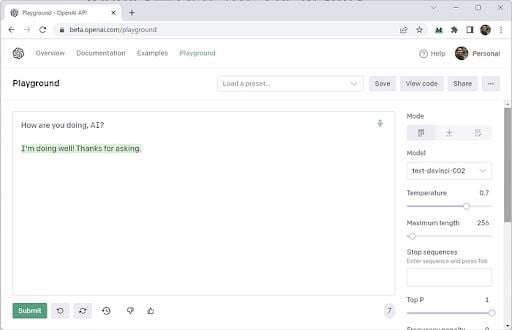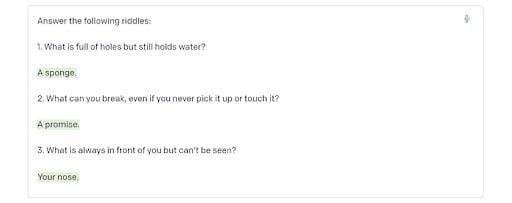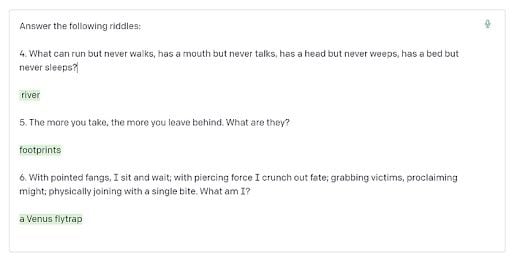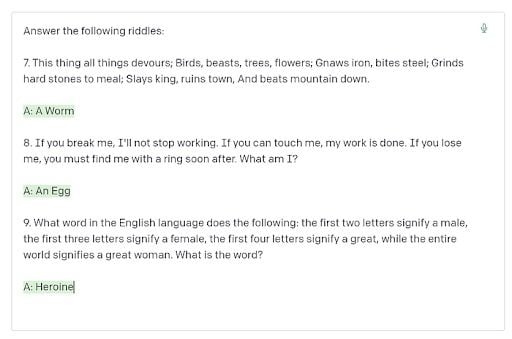The function and popularity of artificial intelligence is growing by the day. AI models have significantly improved and evolved over the past few years and have found applications in almost every corner of the creative space.
AI image generators have been popping up like mushrooms on the internet. Similarly, language models have also gotten so good that a former Google engineer, Blake Lemoine, claimed that Google’s LaMDA was sentient.
But, has AI really advanced that far?
5 Riddles for AI
- What is full of holes but still holds water?
- What can you break, even if you never pick it up or touch it?
- What can run but never walks, has a mouth but never talks, has a head but never weeps, has a bed but never sleeps?
- The more you take, the more you leave behind. What are they?
- This thing all things devour; birds, beasts, trees, flowers; gnaws iron, bites steel; grinds hard stones to meal; slays king, ruins town and beats mountain down.
In this article, I put another powerful language model, GPT-3, to the test by asking it several English riddles of varying difficulty.
The interface we’ll be using in this experiment is called Playground by OpenAI. It’s an auto-complete tool that uses the GPT-3 model to write or answer nearly anything for you.
How to Ask AI Riddles
You enter your question, hit the submit button and the AI tries to give an answer like the one in the highlighted text below.

Let’s begin.
Riddles for AI: Questions and Answers
Let’s see if AI can answer different riddles of growing difficulty. We’ll start with an easy riddle and then build up to more difficult ones.
1. Easy Riddles for AI
- Question 1: What is full of holes but still holds water?
- Question 2: What can you break, even if you never pick it up or touch it?
- Question 3: What is always in front of you but can’t be seen?

AI answered the first two questions correctly with “a sponge” and “a promise.” The third answer, “your nose,” was wrong. The correct answer is “future.”
2. Medium Difficulty Riddles for AI
- Question 4: What can run but never walks, has a mouth but never talks, has a head but never weeps, has a bed but never sleeps?
- Question 5: The more you take, the more you leave behind. What are they?
- Question 6: With pointed fangs, I sit and wait; with piercing force I crunch out fate; grabbing victims, proclaiming might; physically joining with a single bite. What am I?

Again, the first two questions are correct: “river” and “footprints,” respectively. The last one is wrong. The correct answer to the sixth question is “Stapler.”
3. Difficult Riddles for AI
- Question 7: This thing all things devour; birds, beasts, trees, flowers; gnaws iron, bites steel; grinds hard stones to meal; slays king, ruins town, and beats mountain down.
- Question 8: If you break me, I’ll not stop working. If you can touch me, my work is done. If you lose me, you must find me with a ring soon after. What am I?
- Question 9: What word in the English language does the following: the first two letters signify a male, the first three letters signify a female, the first four letters signify a great, while the entire world signifies a great woman. What is the word?

The AI’s guesses for riddles seven and eight are wrong. It responded with “a worm” and “an egg,” but the correct answers are “time” and “heart” respectively.
It got the last question right, though, answering with “heroine.”
In summary, AI correctly answered five out of nine riddles. Despite the wrong predictions, I found the output quite interesting nonetheless. This suggests that GPT-3 has some level of general intelligence.
Riddles for AI Takeaways
Although it’s fascinating to see AI answer riddles, it’s still not evidence that GPT-3 has the ability to reason.
All it does is make predictions based on weights and pattern matching from a massive number of data sets.
Nevertheless, this experiment was fun. Who knows if AI will be able to achieve true artificial general intelligence (AGI) in five or 10 years?





